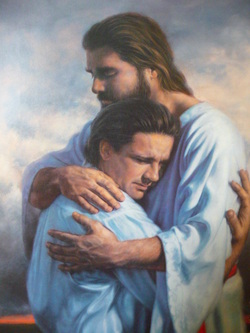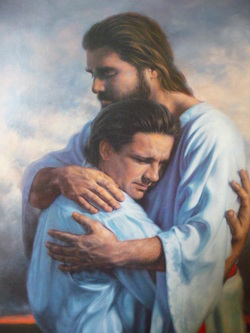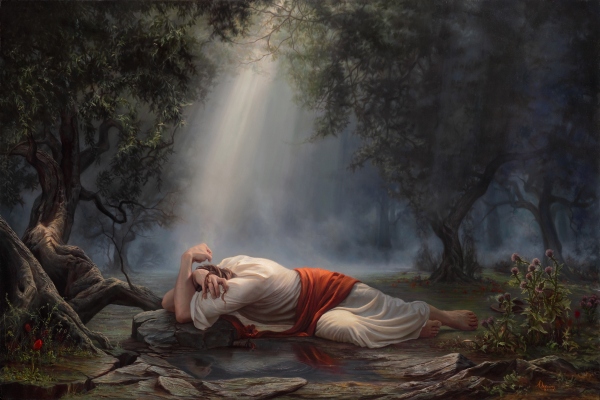 The sensation of human guilt is as universal as it is varied. All of us have experienced at least some form of shame, guilt, embarrassment, or self-directed anger which tells us quite bluntly that our behavior fell below our standards. Guilt affects each of us in a similar way; we feel to some degree that we did something wrong, and we regret getting into these circumstances. But as each person is unique, so is each sin, and therefore each episode of guilt. So many nuances and subtle emotions can mingle with each episode, creating an experience that is simultaneously unique and all-too-common. This emotion, which is never pleasant, can be a very useful tool. A healthy dose of guilt causes us to recognize that we can do better, that our actions were unacceptable, that there is room for improvement, and motivates us to fix the situation. But used to excess by an over-critical mind, unnecessary guilt shifts the focus of shame from one's actions to one's overall worth as a human-being. “ Some anxiety and depression is caused by physical disorders, but much (perhaps most) of it is not pain of the body but of the spirit. Spiritual pain resulting from guilt can be replaced with peace of mind. In contrast to the hard words condemning sin, listen to the calming, healing words of mercy , which balance the harsher words of justice .” -President Boyd K. Packer of the Quorum of the Twelve Apostles of the Church of Jesus Christ of Latter-day Saints As Elder Packer's quote implies, the duty we have been given by Jesus Christ to “forgive all men” ( Doctrine and Covenants 64:10) applies not only to others, but also to ourselves. We all learn pretty early-on in life that other people are not perfect, and that we shouldn't expect perfection. But pretty often, we take a bit longer to learn that we shouldn't expect perfection from ourselves. It is commendable to reach for perfection, and to try every day to get a little closer, but when we set the bar at perfect, and view everything that falls short as failure, we're bound to get quite disappointed with ourselves. As any athlete knows, the key to success is practice and persistence and dedication over a long period of time. It is much easier to climb a staircase or a ladder than it is to jump directly from the ground to the same height. No high jumper has ever gone directly from the couch to a nine-foot vertical jump at the Olympics. This would be a marvelous overall goal for anyone to think of setting, but a goal that lofty would need to be comprised of many smaller goals to become a reality. “First, I'll work on routine and get that down. Then, I'll work to clear five feet. Then, I'll try to clear five feet and three inches, etc., etc.” A beginning jumper shouldn't be discouraged that he can't immediately jump over a house, and similarly, we shouldn't be discouraged just because we have some way to go on the road to spiritual and moral perfection. It's not something that happens right away, but something that comes little by little as we continually work for it.
 God has said that if we wish to live with Him once more, we need to be perfect, but He knows that we can't possibly do that on our own. As mortal beings, we are naturally weak and undisciplined. It is not only expected that we will mess up throughout our lives, but inevitable. So how can God expect perfection from children He knows are incapable of it?
It is with this in mind, that our Heavenly Father sent is Son, Jesus Christ to live among us. As God's Son, Christ had the capability to fully temper and control the natural urges and temptations that His mortal body would experience. Having absolutely no sin of His own, Christ gave Himself as a sacrifice for our sins, and also for our pains, infirmities, and yes, our guilt. He felt all of it. He experienced every bit of suffering that human family had, did, and would ever experience. And why? This was the price paid to allow us an out from our sins.
Thanks to this atonement made by Jesus Christ, our Savior, if we do everything we can to fix the situation presented by our misdoings, and gratefully acknowledge the miraculous sacrifice that Christ made, we can fully repent. And as far as God is concerned, the sin never happened. We are as clean and pure as the day we were born. This is how we achieve perfection, through Christ.
As we earnestly repent of our sins and misdeeds, and look upon Christ, we are given the wonderful gift of a clean conscience. There is no point to carry the shame with us once we have been forgiven by our loving Heavenly Father. It is time to forgive ourselves, and jettison any self-hate from our souls. God doesn't count it against us anymore. Why should we?
 Jesus Christ takes on many roles. He is our teacher, our master, our elder brother, and our redeemer, just to name a few. One exceptionally large role he fills is as the Son of God. But what does it mean to be the Son of God? Aren't we all God's children?
 Life by its very nature is filled with trial and hardship. To experience life is to experience all things, the good and the bad. At times the bad will appear to outweigh any good, and the burden will become so crushing and hard to bear, that our view of the good slips, and we'll see nothing but the darkness supplied by our anguish. There is however, a way out of rough times, and back into the light. His name is Jesus Christ.I sometimes wonder why a God that loves me would put me through such pain. Why, when I am trying my hardest, am I succumbing to woes of a troubled heart? I have had a handful of times in my short life where anguish seemed to prevail, and the grasp of the evil one seemed to drag my soul deeper. Each of these experiences, though challenging, have seemed to fortify me for the next, and show me by stark contrast the beauty of a good day. I come out of them taking more pleasure in simple things, and with more faith that the future will be better. It stands to reason then, that this is why my Lord and Savior would deem me worthy of such pain, even when I am being righteous. That my Father, in an effort to strengthen me for things to come, is giving me a little bit more than I thought I could handle, so that in the future, I know I can handle more. Sometimes, however, this knowledge alone just isn't enough to carry on with. We might not have the strength inside us to withstand every challenge, and we may stumble and fall. But that is the beauty of Jesus Christ; that when we have spent some time at our lowest, and are holding on with the last piece of energy within us, He can step in and stretch us. He will take a normal man who is trying, and create something extraordinary. Though He may not have made our problems smaller, He has made us big enough to conquer them. If we still feel it unfair that God would deign to give us trials, we need only remember one thing: the Son of God, our Savior Jesus Christ, experienced them too. In the Garden of Gethsemane, our Lord experienced the anguish and grief, for every sin, every disappointment, and every sorrow that has ever been felt, or will be felt. He experienced even your pains. From this day on, stand strong in the comforting knowledge that through every time of trouble, every moment of pain, Jesus the Christ has been there, holding you, helping you, or cheering you on. He truly wants you to be happy, more than even you do. That is why He descended below all things, so that no matter how far you fall, He will be there to catch you. All you must do is trust that He can show you the way back up. And follow Him.
 Those of us who can see generally take this ability for granted. We hear this a lot: that we, as people, expect some mundanely normal experience to be a given. But it's all too true. You don't know what you have until you no longer have it. The visually impaired know all too well that sight is a blessing of the greatest kind. This was no less true than in the time of Jesus Christ. Sometime before Jesus rode triumphantly into Jerusalem, the Savior was traveling through the city of Jericho. As He came into the city, the people of Jericho were understandably stirred up by His presence. A stone's throw away, a blind man sat by himself, wondering what all the clamor was about. This man, unable to see, was probably unable to work. Though being blind is still no picnic, obviously it wan't like today, when the blind are blessed with many advanced tools allowing them to function in the everyday world. Nor did the blind (or those with any handicaps for that matter) have laws in place to protect them from unemployment and poverty. In many circumstances, a handicap could be a social death-sentence. The blind, dumb, deaf, and lame could only sit on the periphery, dependent on the kindness of others. When this particular man asked a passerby, He learned, to his delight, that the crowd was stirred up because Jesus of Nazareth was passing through. This was his chance. The man yelled out to his Savior, pleading, "Jesus, thou Son of David, have mercy on me!" The people, shocked by how loud and audacious this man was being, scolded him. They told him to hold his peace. It was not dignified to be so bold. But he did not care. It didn't matter what these people thought. Jesus had come to bless him, to lift him out of his humble circumstances. He yelled again, "Thou son of David, have mercy on me!" The Lord commanded that this man be brought to Him. With the man before Him, He asked, " What wilt thou that I shall do unto thee?"The man knew what he required. Trusting in his God, he said, "Lord, that I might receive my sight." Pleased with this humble man, Jesus said, " Receive thy sight: thy faith hath saved thee."In an instant, his vision was restored. Before him stood his Savior, the Lord Jesus Christ. Oh, the sweetness of that first of many wondrous sights this man would see. He got up, and followed his Savior, and the multitude glorified God. Even if our physical eyes are in perfect health, we all may lose our sight. Being blinded by our carnal desires and worldly temptations, we may at times find ourselves lost in the darkness, with seemingly no way of getting back. I testify though, that if we but have faith, and turn unto Him who can restore our vision, that we can know the way to true happiness. The Lord and Savior Jesus Christ is that way, and through Him and Him alone can we be made whole. His eternal power will open our eyes if we but ask. We need not be ashamed that we come to Him, for why would the opinions of other's matter when our eternal happiness can be secured through Him we approach? I leave you with this message in the His holy name, Jesus Christ-- Amen
We all make sacrifices. Every one of us has at one time or another given up something for a greater purpose. We all know how this feels. But one thing that none can begin to comprehend is the magnitude of the sacrifice our Lord and Savior Jesus Christ made on our behalf. A mortal being cannot feel the same degree of love, or experience the same level of devotion that our elder brother had for us. But through the guiding influence of the Holy Ghost, one can come to appreciate and relish the gift that our Lord has given us in the atonement, and we can learn to accept this gift in our lives and apply it where we are in need. The atonement of our Savior was an all-encompassing sacrifice. Prior to the time of Jesus, believers followed what is known as the Law of Moses, the code of righteousness given by God in that era. With the coming of Jesus Christ, however, the Law of Moses was replaced with a higher law. The night before his crucifixion, Jesus and his twelve apostles convened in the top floor a house, and had what we refer to as the Last Supper. Jesus broke and blessed bread for the apostles and explained that it was a representation of his body. He blessed and passed around wine, explaining that it was a representation of the blood he would shed for them. These actions would in time become known as the Sacrament. After the Last Supper, Jesus and his disciples walked into the garden of Gethsemane. The Savior told his disciples to stay back and kneel, to pray that they enter not into temptation. He continued to walk several yards further, until he was alone. It was then that Jesus Christ prayed to his eternal father, and begged, s aying, "Father, if thou be willing, remove this cup from me: nevertheless not my will, but thine, be done."Our Redeemer suffered there in the Garden of Gethsemane. He felt every pain, experienced every ailment, and endured all sorrow that man had ever, and will ever feel, all at once. He writhed in pain, and in his agony, he bled from every pore of his body.He was then betrayed by his apostle, Judas, who sold him to the angry Pharisees, who beat him, mocked him, unjustly tried him, and crucified him, one of the most painful forms of murder that man has ever devised. He gave up the ghost, and ascended unto his father, returning three days later as a perfect, resurrected being.This pain was not needless. Our Lord Jesus Christ suffered these agonies to understand us, to descend below the deepest depth that man could sink to, to empathize with all pain and sorrow that man could feel. His agony atoned for our pains and ailments, but more importantly, it atoned for our sins. Thanks to the Lord's sacrifice, we can activate the atonement when we sin, we can repent, and turn away from our sins by partaking of the sacrament and washing away our sins with the help of our Savior and Redeemer.We must always remember the love and devotion that Jesus Christ feels for us. He, as our elder brother, wants nothing less than for us to succeed. The life he freely gave and the crushing burden he freely bore are indeed a testament to his loving care, and he loves us all unconditionally. I leave you with my testimony, that our Savior Jesus Christ is the literal son of God, that he atoned for our sins so that we could come closer to our father. I testify of our Savior's love, of my love for him, and of the perfect example of righteousness he is in my life. I close this article in his holy name, Jesus Christ--Amen
|







 RSS Feed
RSS Feed